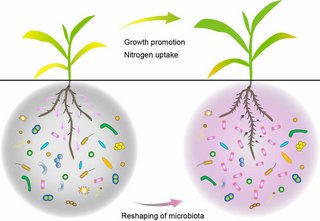The study was led by the Universities of Bonn and Southwest China. Cologne-based plant researcher Professor Marcel Bucher of CEPLAS, the Cluster of Excellence on Plant Sciences, took part in the study. Professor Bucher's research group has many years of experience in studying the interaction between plants and the soil in which they grow, and in the project contributed to the methodology in the studies on microorganisms in the root zone, the rhizosphere, of maize plants in the field and under controlled conditions in the climate chamber.
The scientists involved had studied various maize varieties that differed significantly in their yield. In their search for the cause, they came across an interesting enzyme, flavone synthase 2. "The high-performance breeding line 787 that we studied contains large amounts of this enzyme in its root," explains Dr. Peng Yu from the Institute of Crop Science and Resource Conservation (INRES) at the University of Bonn. "It uses it to produce certain molecules from the flavonoid group and releases them into the soil."
Flavonoids give flowers and fruits their colour. In the soil, however, they fulfil another function: they ensure that very specific bacteria accumulate around the roots. These microbes, in turn, are the cause of more lateral roots forming on the roots. "This allows the maize to absorb more nitrogen from the environment, among other things," explains Prof. Dr. Frank Hochholdinger from INRES. "For this reason, it grows faster, especially when nitrogen supply is scarce."
In experiments, the researchers were able to show how well this works. They used a maize variety with the abbreviation LH93, which normally produces rather measly plants. However, this changed when they planted this variety in soil in which the high-performance line 787 had previously grown: LH93 then grew significantly better. The effect did not occur when the botanists sterilized the soil before repotting. This shows that the enriched bacteria are indeed responsible for the growth turbo, because these had been killed during sterilization.
The researchers were able to show in another experiment that the microorganisms actually promote the growth of the lateral roots. In this, they used a variety of maize that cannot form lateral roots due to a mutation in its genome. However, when they added the bacterium to the soil, the roots of the mutant branched out. However, the way in which this effect occurs has not yet been clarified. In addition, the maize plant then coped far better with nitrogen deficiency than without microbial support.
Nitrogen is extremely important for plant growth - so much so that farmers artificially increase its amount in the soil by fertilizing. But parts of the fertilizer are washed off the fields into streams with the rain or enter the groundwater. They can also enter the atmosphere in the form of nitrogen oxides or as ammonia gas, where they contribute to the greenhouse effect, among other things. In addition, the production of nitrogenous fertilizers requires a lot of energy. "If we breed crops to increase their nitrogen supply with the help of bacteria, this could significantly reduce environmental pollution," Yu hopes.
Marcel Bucher of the Institute for Plant Sciences sees the new findings in the context of wider research: “In addition to nitrogen, agricultural soils are also fertilized with a lot of phosphorus. The extraction of phosphorus from rock and the production of phosphate fertilizer require a lot of energy and water. Similar to nitrogen, certain soil microbes improve the phosphate supply to plants. Only here, in addition to bacteria, certain fungi are often the main players," explains the CEPLAS scientist. "The findings published here enable the development of novel combined strategies for growing maize and other crops with increased nitrogen and phosphorus efficiency using the beneficial microbiota in the rhizosphere."
In addition to the University of Bonn and Southwest University, the Leibniz Institute of Plant Genetics and Crop Plant Research in Gatersleben, the Max Planck Institute for Plant Breeding Research in Cologne, working groups from the universities of Cologne, Göttingen and Kiel, and other international partners from China and Belgium were involved in the study.
The study was funded by the German Research Foundation (DFG) and Southwest University (China), among others.
Media Contact:
Professor Dr. Marcel Bucher
CEPLAS Cluster of Excellence
Universität zu Köln
+49 221 470-2481
m.bucheruni-koeln.de
Press and Communications Team:
Robert Hahn
+49 221 470-2396
r.hahnverw.uni-koeln.de
Publication:
Plant flavones enrich rhizosphere Oxalobacteraceae to improve maize performance under nitrogen deprivation, Nature Plants; DOI:
https://dx.doi.org/10.1038/s41477-021-00897-y
